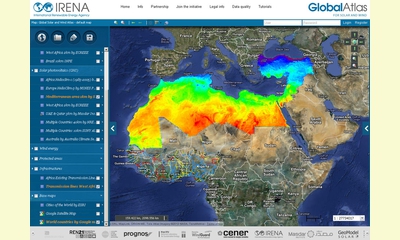|
|
Global Atlas for Solar and Wind launched
an article by Clean Energy Ministerial
The groundbreaking Global Atlas for Solar and Wind
is now available online. The new web-based portal,
which serves as a repository for renewable energy
resource data from around the world, represents
the largest initiative ever undertaken to assess
renewable energy potentials on a global scale.
Launched during the International Renewable Energy
Agency’s (IRENA) January Assembly, the ambitious
project was initiated by the Clean Energy
Ministerial (CEM) Multilateral Solar and Wind
Working Group and is the result of a two-year
collaborative effort with IRENA.

The Global Atlas for Solar and Wind is a comprehensive resource to help countries evaluate renewable energy potentials.
click on photo to enlarge
The Atlas provides critical information that can
help countries evaluate renewable energy potentials
and can function as a catalyst to trigger planning
and policy development. It can also help investors
assess emerging and new renewable energy markets.
The portal features high-quality resource maps
from leading technical institutes and simplified
models for evaluating the technical potential of
renewable energy supplies. It also contains video
tutorials and information on best practices for
evaluating solar and wind potentials.
“In the next 10 years we expect a huge rise in the
investments in renewable energy. The Global Solar
and Wind Atlas will help us make the right
decisions,” said Martin Lidegaard, Danish Minister
of Climate, Energy and Building and a member of
the CEM Multilateral Solar and Wind Working Group.
The Multilateral Solar and Wind Working Group
played a critical role in developing the Atlas,
with working group countries contributing
resources such as satellite maps, validated data
sets of national atlases, and the expertise of
their national research facilities. The working
group, one of CEM’s 13 initiatives, works to
promote the accelerated deployment of solar and
wind technologies.
The Atlas will be expanded in 2013 to include solar
and wind expert analysis modules. Geothermal,
hydropower, and bioenergy content will also be added
to the Atlas in the future.
The Atlas is available at www.res-atlas.org. A Global Atlas
widget is also available and allows organizations to
embed the launcher into their own website.
|








|
DISCUSSION
Question(s) related to this article:
How can we get to a sustainable, peaceful economy?,
* * * * *
LATEST READER COMMENT:
Annie Leonard: How to Be More than a Mindful Consumer
The way we make and use stuff is harming the world—and ourselves. To create a system that works, we can't just use our purchasing power. We must turn it into citizen power.
by Annie Leonard
posted Aug 22, 2013
Stuff activist Annie Leonard: “Consumerism, even when it tries to embrace ‘sustainable’ products, is a set of values that teaches us to define ourselves, communicate our identity, and seek meaning through accumulation of stuff, rather than through our values and activities and our community.” YES! photo by Lane Hartwell.
Since I released "The Story of Stuff" six years ago, the most frequent snarky remark I get from people trying to take me down a notch is about my own stuff: Don't you drive a car? What about your computer and your cellphone? What about your books? (To the last one, I answer that the book was printed on paper made from trash, not trees, but that doesn't stop them from smiling smugly at having exposed me as a materialistic hypocrite. Gotcha!)
Let me say it clearly: I'm neither for nor against stuff. I like stuff if it's well-made, honestly marketed, used for a long time, and at the end of its life recycled in a way that doesn't trash the planet, poison people, or exploit workers. Our stuff should not be artifacts of indulgence and disposability, like toys that are forgotten 15 minutes after the wrapping comes off, but things that are both practical and meaningful. British philosopher William Morris said it best: "Have nothing in your house that you do not know to be useful or believe to be beautiful."
Too many T-shirts
The life cycle of a simple cotton T-shirt—worldwide, 4 billion are made, sold, and discarded each year—knits together a chain of seemingly intractable problems, from the elusive definition of sustainable agriculture to the greed and classism of fashion marketing.
The story of a T-shirt not only gives us insight into the complexity of our relationship with even the simplest stuff; it also demonstrates why consumer activism—boycotting or avoiding products that don’t meet our personal standards for sustainability and fairness—will never be enough to bring about real and lasting change. Like a vast Venn diagram covering the entire planet, the environmental and social impacts of cheap T-shirts overlap and intersect on many layers, making it impossible to fix one without addressing the others.
I confess that my T-shirt drawer is so full it's hard to close. . ...more.

|
|









